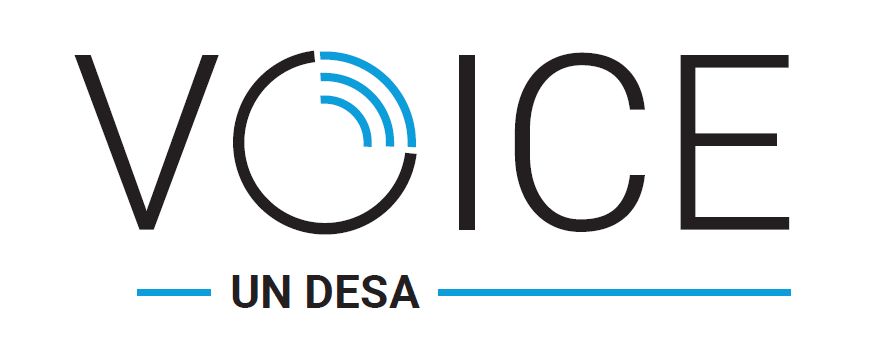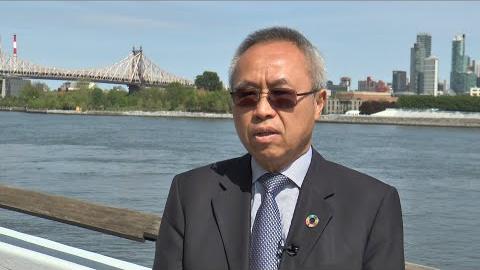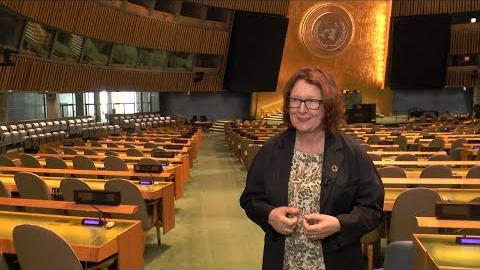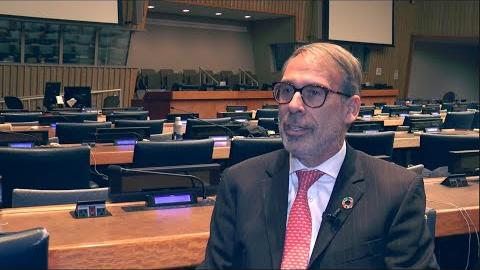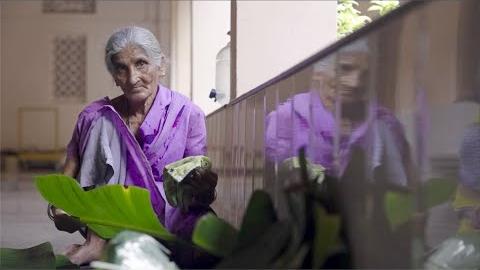UN DESA Voice is an insider's look at the United Nations in the area of economic, social and sustainable development policy. It is produced by the Strategic Planning and Communications Services of the Department of Economic and Social Affairs with articles written by UN DESA staff. This is an electronic publication - no printed edition is generated.
The current edition
February 2026
Every morning around the world, billions of people step onto a bus, bike to work, wait for a train, or drive long distances to reach their jobs, schools, markets, and health care. Meanwhile, freight systems operate around the clock to deliver food, medicines, and essential goods to communities everywhere. As it connects lives and livelihoods, access to sustainable transport is a question of life and death, poverty and prosperity, and overall well-being.
2026
Every morning around the world, billions of people step onto a bus, bike to work, wait for a train, or drive long distances to reach their jobs, schools, markets, and health care. Meanwhile, freight systems operate around the clock to deliver food, medicines, and essential goods to communities everywhere. As it connects lives and livelihoods, access to sustainable transport is a question of life and death, poverty and prosperity, and overall well-being.
The Economic and Social Council (ECOSOC) will commemorate its 80th anniversary by holding a special event on 23 January 2026. The event will be an opportunity to celebrate the Council’s many milestone achievements in improving people’s lives around the world. “We need to reflect on the legacy of ECOSOC and reaffirm its central role in shaping a more inclusive, resilient, and forward-looking multilateral system,” says H.E. Mr. Lok Bahadur Thapa (Nepal), President of ECOSOC.
2025
Our world is becoming increasingly urban. Cities are now home to 45 per cent of the global population of 8.2 billion, according to UN DESA’s World Urbanization Prospects 2025: Summary of Results, released on 18 November 2025.
“Thirty years ago, the world gathered in Copenhagen and made a promise: to put people at the centre of development. This November, we meet again—this time in Doha—for the Second World Summit for Social Development. This Summit comes at a critical moment,” said UN DESA’s Under-Secretary-General, and Summit Secretary-General Li Junhua, pointing to widening inequalities, eroding trust and communities struggling with conflict and climate shocks.
The newly released Gender Snapshot 2025 paints a nuanced picture of progress towards gender equality. On one hand, there have been historic gains: girls are more likely to complete school than ever before, and maternal mortality fell by nearly 40 per cent between 2000 and 2023. Women’s participation in climate negotiations has doubled. In the past five years alone, 99 positive legal reforms have been enacted to dismantle discrimination.
Amid the shimmering heat and sleek skyline of Manama, Bahrain, Eman Fareed methodically pinches off bits of dough and spaces the soon-to-be cookies evenly on a baking tray in her kitchen. Eman Fareed is just one among the millions of people whose lives have improved in the 10 years since the world embarked on one of its most ambitious journeys yet - achieving the SDGs.
“The multilateral system is the best we've got. There is no other system that can help us to deal with our global problems,” says Bob Rae, President of the Economic and Social Council and Permanent Representative of Canada to the United Nations. As the international community is getting ready to convene for the 2025 High-level Political Forum on Sustainable Development this month, Ambassador Rae stresses the opportunities for multilateral action.
This year, UN DESA is leading milestone events aimed at advancing sustainable development for all. Many of them are lining up this month, bringing together the international community to focus on promoting a healthy ocean, our digital future and unlocking financing to deliver the promise of the Sustainable Development Goals (SDGs).
Only a few weeks into her position, UN DESA’s new Assistant Secretary-General for Policy Coordination, Ms. Bjørg Sandkjær, met with UN DESA Voice for a one-on-one interview. Bringing over 26 years of experience from working within the area of policymaking and international development, we spoke about her background, her passion for international solidarity, her new role, and the difference that international development makes for people around the world.
“We have witnessed how youth can mobilize global action,” said UN DESA’s Under-Secretary-General Li Junhua, stressing the importance of young people’s involvement in shaping a future that is more inclusive, peaceful, sustainable and fair. “Young people [are] showing up, contributing their skills, expertise, ideas and energy to solve the pressing challenges we are facing today so that future generations are better off,” Mr. Li said.
“Data are critically important for everyone,” says Stefan Schweinfest, Director of UN DESA’s Statistics Division. “All the decisions that you take in your life, you're basing them on data,” he stressed, as we spoke on the important work of the UN Statistical Commission. On 4-7 March 2025, some 600 statisticians from across the world will come together at UN Headquarters in New York to ensure better data, better lives.
30 years ago, world leaders united around a groundbreaking commitment to put people at the centre of development. At the World Summit for Social Development in Copenhagen, they pledged to eradicate poverty, promote social integration, and achieve full and productive employment for all.
 Welcome to the United Nations
Welcome to the United Nations
